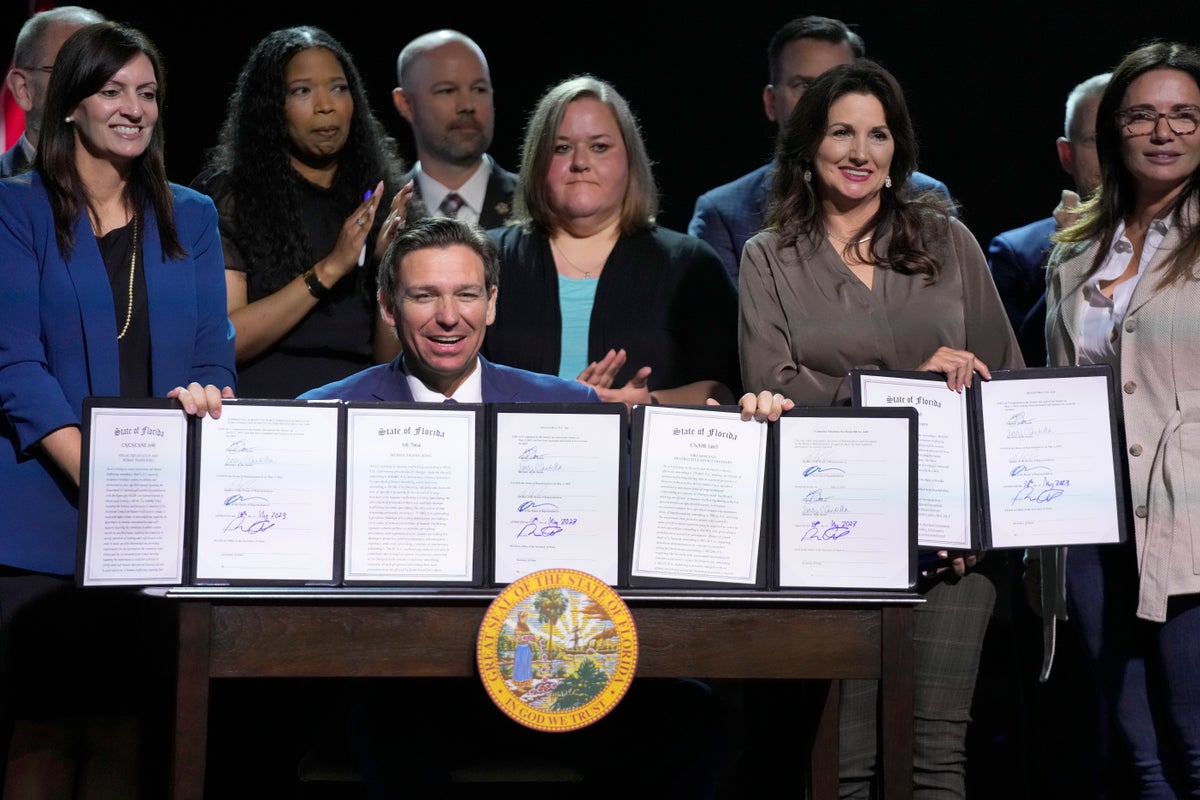Sign up for the daily Inside Washington email for exclusive US coverage and analysis sent to your inboxGet our free Inside Washington email
Ron DeSantis signed a sweeping package of bills targeting transgender people, in what’s been described as the most impactful series of anti-LGBT+ legislation in state history.
The bills – which restrict gender-affirming care for minors, threaten drag shows, forbid people from using bathrooms that match their gender identity, and prevent people from using their chosen pronouns at schools – were sharply criticised by LBGT+ advocates, and are out of step with established procedures for trans people back by major medical organisations like the American Medical Association.
Former Florida state representative Carlos Guillermo Smith, the first openly LGBT+ Latino elected to the state legislature, wrote on Twitter the bills are “revoking our freedoms and ruining people’s lives in his quest for political power.”
“We will NOT be erased,” he added. “We will RESIST. We will FIGHT BACK. We will proudly RAISE OUR FLAGS. We will WIN.”
State representative Anna V Eskamani accused the Republican governor, who is widely thought to be running for president in 2024, of pushing “an extreme agenda that is fueled by disinformation, isolating already marginalised people.”
“In Florida, diversity is our strength – not a weakness or something to demonize and be afraid of,” she wrote in a statement on Twitter on Wednesday.
The governor signed the bills on Wednesday at a campaign-style event at an evangelical school in Tampa, where he tossed Sharpies into the crowd and stood before a banner that read, ‘Let Kids Be Kids.’
“We are going to remain a refuge of sanity and a citadel of normalcy, and kids should have an upbringing that reflects that,” Mr DeSantis said.
Lambda Legal, which advocates on behalf of LBGTQ+ people, said in a statement to The Independent that the bills showed a “callous disregard for LGBTQ+ Floridians and, in particular, trans youth by facilitating homophobia and transphobia and exposing this most vulnerable population to discrimination, harassment, and abuse.”
The bills backed by the Republican governor include restrictions on gender-affirming treatments for minors like puberty blockers and sex reassignment surgery.
One provision classifies such care, which is supported by the medical establishment, typically for older teens, as a form of child abuse that can lead to children temporarily being taken away from their families.
“They have cloaked themselves in being the party of less government and parental rights, and what we’re seeing now is the total opposite,” Democratic state senator Shevrin Jones, who is gay, told CNN. “Every other parent has the right to raise their child the way that they want to as long as your child is not gay, trans, bisexual. That’s freedom for some parents but not for all parents.”
Others effectively legislate away the concept of being transgender altogether, including a bill forbidding trans people from using bathrooms or changing rooms that match their gender identity, and another law that requires schools to hold that “a person’s sex is an immutable biological trait” and forbids faculty and students from using their chosen pronouns.
The Florida legislation is part of a larger trend, where Republican leaders have made legislative attacks against LGBT+ people, particularly trans people, a central part of their platform.
According to the Human Rights Campaign, nearly a third of transgender youth in the US live in states that have passed bans on the kind of gender-affirming care that’s often a lifeline for young people.
A nationwide campaign has seen hundreds of bills aimed at LGBT+ people, particularly at young trans people, filed in nearly every state within the last two years. At least 15 states have enacted laws or policies banning gender-affirming care for young trans people, and more than a dozen others are considering similar measures. Court injunctions have blocked bans from going into effect in three states.




